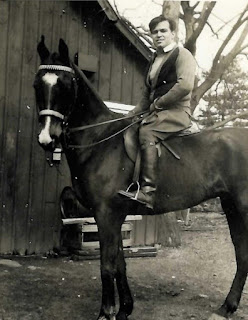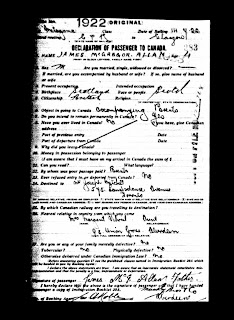BORN NOVEMBER 6, 1915
PALISADES, NEW JERSEY, USA
If Alfred and the first American Parkyns thought they’d
escaped the harsher side of life when they put London’s Mile End behind them,
they were wrong. Alfred saw the impact on the family of his uncle’s Edward’s death
in France at the end of the First World War. Memories of Edward must surely
have faded in young Alfred’s memory by the time Edward became the namesake of
his town’s American Legion post. Tragedy didn’t end with the end of war. Alfred
lost his 11-year-old brother during Alfred’s senior year in high school. Two
years later, Alfred’s 50-year-old father passed away. The successive losses
left Alfred’s mourning mother and sisters reeling but undoubtedly grateful for
his stabilizing presence in the family. By 1940, Alfred’s life was on a course
that kept him close to home. At 26 years of age, Alfred had a steady but menial
job in the Bronx. His elder sister had married, leaving Alfred at home with his
mother and 13-year-old sister Renee, who adored the big brother she knew as
Allie. Over the course of 30 years, the Parkyn family’s exuberance and success
had, through family tragedy and economic disaster, given way to a grittier
determination to persevere together.
Alfred harbored dreams of becoming a pilot, but he was both
too old and lacked the bachelor’s degree required for military pilot programs.
Opportunities in civil aviation were scarce, and flight training wasn’t cheap.
With his spare income, Alfred had managed to accumulate a meager eight hours of
flight time and was making payments on a ground school course he’d taken.
At some time during the summer of 1940, Alfred must have
come across one of the recruiting advertisements posted at municipal airports
by the Clayton Knight Committee. Replete with images of Spitfire fighter
planes, the flyers sought men for the Royal Canadian Air Force, and steered
applicants to Knight’s shadow organization at the Waldorf Astoria Hotel. The
Waldorf was on Alfred’s route home from work, but Alfred’s workday clothes would
not have been in keeping with the hotel’s splendor; he must have made a trip
from home, in his best clothes, when he applied.
And he did apply. His move must have concerned family
elders, who would have numbered themselves among America’s isolationist population
after Uncle Edward’s death. Without a steady income or husband, his mother must
have found Alfred’s decision to be alarming.
Winning his wings in November 1940, Alfred flew home for a
brief visit. Once in England, he wasted no time in connecting with family in
Surrey, which became his favorite destination during leave periods. He wrote
dutifully to his mother and sister, sending photos of “his” room above a Surrey
shop, and the Earl Beatty Pub, where he enjoyed a pint now and then.
Alfred must have seemed brash and outspoken to his British
squadron mates, as many Americans did. He was fond of them, describing them in
a 1942 interview as “hard to get next to, sometimes,” but noted “they have
horse sense. These guys know their racket.” Little memory exists of Alfred’s
relationships with his fellow aviators – of the 400-plus men he could have met
while flying with 207 Squadron, half were dead within a year of his final
mission. Bomber Command’s low attrition – 3 percent
– equated to certain death for aircrew within 34 missions.
Mere months after arriving at his bomber squadron, Alfred
failed to return from a mission. His death was the fourth tragedy to strike the
Parkyn’s in 20 years. After the war’s end, those
surviving family members worried about work and the future. They moved apart to
the corners of the United States leaving Alfred’s fading story behind them.
Alfred’s sisters never got over their sense of loss. Years
later, the family children would remember his sisters, Gladys and Renee, speaking of
their beloved brother "Allie" still haunted by the vague nature of his fate –
missing, presumed dead, with no known grave.











